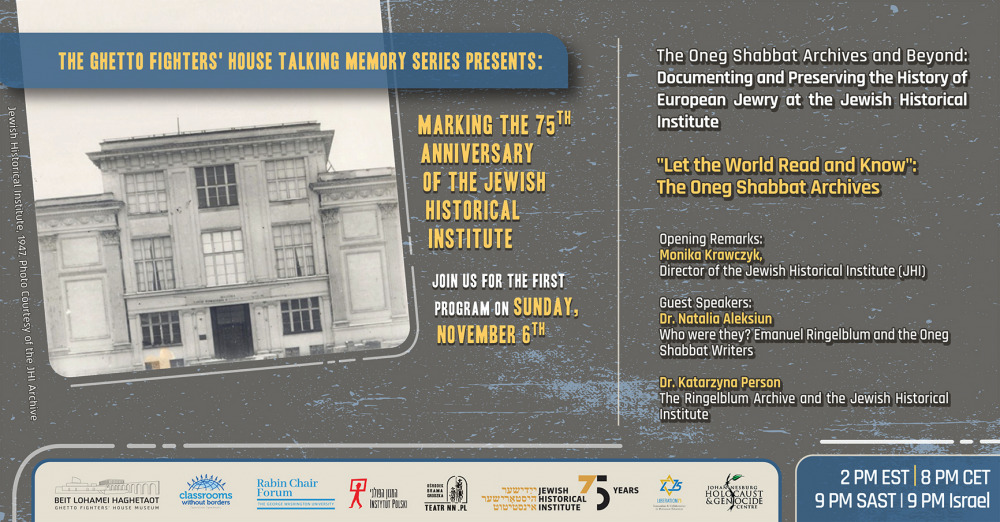Menu
- News
- Events
- Oneg Shabbat
- Collections
- Research
- Exhibitions
- Education
- Publishing Department
- Genealogy
- About the Institute
- Bookstore


"Let the World Read and Know": The Oneg Shabbat Archives
Opening Remarks:
Monika Krawczyk, Director of the Jewish Historical Institute (JHI)
Guest Speakers:
Dr. Natalia Aleksiun
Who were they?
Emanuel Ringelblum and the Oneg Shabbat Writers
Dr. Katarzyna Person
The Ringelblum Archive and the Jewish Historical Institute
From the moment that its existence became widely known, the Ringelblum Archive (also known as the Underground Archive of the Warsaw Ghetto) was widely regarded as a collection of unusual significance. Under the initiative of historian Emanual Ringelblum, a group of social activists incarcerated in the Warsaw Ghetto created the archive between 1940 and 1943 with the aim to document the persecution of Jews in occupied Poland. Emulating the working principles of YIVO (Yidisher Visnshaftlekher Institut, Yiddish Scientific Institute), the Warsaw group gathered and produced a total of 35,000 pages of documents, in Polish, Yiddish, Hebrew, and German and stowed them away secretly within the Ghetto. Among the documents were diaries, accounts from approximately 300 Jewish communities from the whole territory of occupied Poland, school essays, research works, and official German documents: like posters, identification cards, and food ration cards. There were also some 70 photographs and over 300 drawings and paintings.
The Archive was retrieved in parts from the ruins of the Warsaw Ghetto: Part I (concealed on August 3, 1942) was found on September 18, 1946, and Part II (concealed in early February 1943) was found on December 1, 1950.
Who were the people who created this archive? Dr. Natalia Aleksiun will share with us her research on the main contributors to one of the most important archives that was written as the events were happening.
In her presentation, Dr. Katarzyna Person will discuss the academic significance of the archive and the methods used to bring this extraordinary collection to the wider public.
This program is in partnership with the Jewish Historical Institute in Warsaw, the Polish Institute in Tel-Aviv, the Grodzka Gate – NN Theatre in Lublin, the Johannesburg Holocaust & Genocide Center, Liberation 75, Classrooms without Borders, and the Rabin Chair Forum at George Washington University.
2 PM EST | 8 PM CET | 9 PM SAST | 9 PM Israel
Register here:
https://us02web.zoom.us/meeting/register/tZMud-6sqzkpGdT92hxG34YshByIVVgm6Dtx